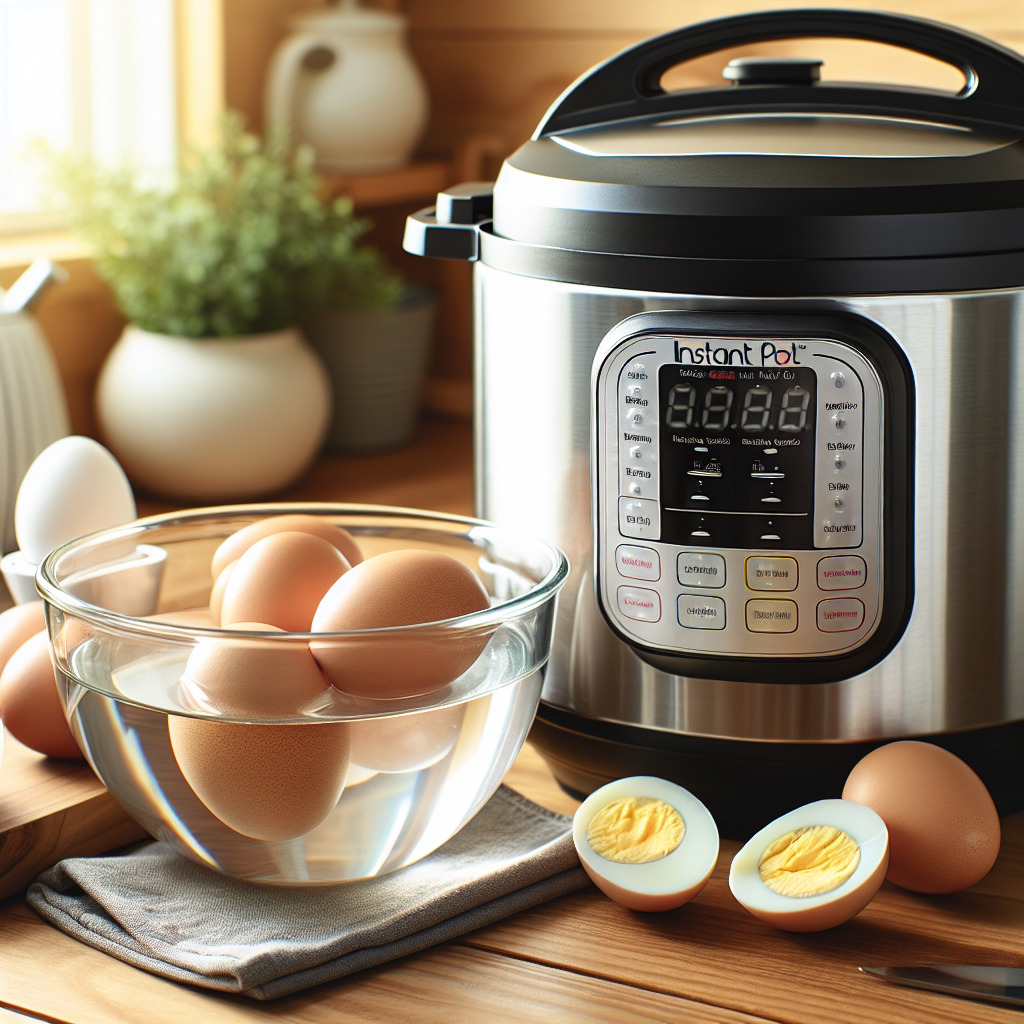An Instant Pot, a multi-functional electric pressure cooker, has revolutionized traditional cooking methods, including the way we boil eggs. Often hailed for its efficiency and utility, this appliance has rendered the once daunting task of perfecting hard-boiled eggs into a simplified, foolproof method. Where time, temperature, and technique were once variables that needed meticulous monitoring, the Instant Pot provides a consistent environment that makes the process nearly automatic.
Historically, hard boiling eggs involved a pot of water, a stove, and often a good bit of trial and error to get the timing just right. Since the commercial introduction of the Instant Pot in 2010 by Canadian inventors Robert Wang, Yi Qin, and Dongjun Wang, this culinary chore has seen a significant transformation. By using high-pressure steam, the Instant Pot cooks eggs faster than traditional methods and with remarkable uniformity. This simple but innovative approach to cooking eggs has become increasingly significant as lives have become busier and kitchen gadgets that streamline meal prep are more in demand.
According to a survey, over 20% of American households own and routinely use an Instant Pot, with many users citing the device’s ability to cook a variety of foods quickly and uniformly as a key benefit. Specifically, for hard-boiled eggs, the Instant Pot not only speeds up the cooking process but also makes the peeling much easier — a common frustration associated with traditionally cooked hard-boiled eggs. The shells practically slip off, wasting less of the edible egg and providing a more appealing end product, making it a preferred method for both experienced cooks and novices.
The rise of social media has also played a significant role in popularizing Instant Pot recipes, including those for hard-boiled eggs. Platforms like Pinterest, YouTube, and Instagram are awash with tutorials and personal anecdotes celebrating the versatility and reliability of the Instant Pot. The multitude of tips, tricks, and recipes shared online has not only bolstered the community of Instant Pot enthusiasts but has also made culinary techniques more accessible to the average person, democratizing cooking skills that were once considered daunting or time-intensive.
How to Make Perfect Hard-Boiled Eggs with an Instant Pot?
An Instant Pot, a versatile multicooker, makes the process of cooking hard-boiled eggs surprisingly simple and foolproof. Using the pressure cooking feature, eggs are evenly cooked, making them easy to peel and perfectly done every time. The primary advantage of using an Instant Pot for hard-boiled eggs lies in the consistency and timeliness it offers—usually cooking eggs perfectly in just minutes under pressure, followed by a quick release. This method stands out for its ability to produce a clean, smooth finish on your eggs, making them ideal for further culinary use, whether it’s chopping them up for a salad, making deviled eggs, or simply enjoying them as a quick protein snack. Read on to explore detailed steps, timings, and additional tips to master this simple yet essential cooking skill with your Instant Pot.
How to Make Instant Pot Hard Boiled Eggs
Making hard boiled eggs in an Instant Pot is a simple and efficient process. Due to the Instant Pot’s pressure cooking capabilities, it can consistently produce perfectly cooked eggs with ease. Here’s how you can achieve perfect Instant Pot hard boiled eggs every time.
Ingredients and Equipment Needed
- Eggs (as many as you want, as long as they don’t stack above the max fill line)
- 1 cup of water
- Instant Pot
- Steamer basket or the trivet that came with your Instant Pot
Step-by-Step Guide
- Place the steamer basket or trivet into the Instant Pot.
- Add 1 cup of water to the pot.
- Arrange the eggs in the basket or on the trivet.
- Secure the lid of the Instant Pot and set the valve to the ‘sealing’ position.
- Select the ‘Manual’ or ‘Pressure Cook’ setting, and set the time for 5 minutes at high pressure.
- Once the cooking cycle is complete, allow the pressure to release naturally for 5 minutes, then do a quick release for any remaining pressure.
- Carefully remove the eggs and place them in a bowl of ice water for 5 minutes to stop the cooking process.
- Peel and enjoy, or store in the refrigerator unpeeled for up to a week.
Tips for Perfect Eggs
For those seeking to perfect their Instant Pot hard boiled eggs, consider the following tips:
- Older eggs peel easier than fresh eggs. If possible, use eggs that have been in your refrigerator a few days.
- The 5-5-5 method is popular among many Instant Pot users: 5 minutes cooking, 5 minutes natural release, 5 minutes in ice water for perfectly easier peeling.
- If your eggs are cracking during cooking, try reducing the cooking pressure from high to low.
The Science Behind the Process
Cooking eggs in an Instant Pot uses steam and pressure rather than the traditional boiling method. This allows for a more controlled cooking environment, reducing the chances of overcooking and making the peeling process much easier. Pressure builds up inside the shell during cooking, which separates the membrane from the egg white and simplifies peeling.
Storage and Usage Ideas
Instant Pot hard boiled eggs can be stored in the refrigerator for up to a week. Ensure they are kept in an airtight container if they are already peeled. Unpeeled eggs can simply be kept in the carton they came in. They’re perfect for quick snacks, salads, sandwich fillings, or for making deviled eggs.
According to a 2019 survey by the American Egg Board, 60% of Americans say they would be more likely to purchase a kitchen appliance like an Instant Pot if they knew it could be used to prepare eggs, proving the popularity and utility of egg-cooking functionalities in multipurpose kitchen devices.
https://youtube.com/watch?v=_Z6D8NROpKM
DASH Rapid Egg Cooker: 6 Egg Capacity Electric Egg Cooker for Hard Boiled Eggs, Poached Eggs, Scrambled Eggs, or Omelets with Auto Shut Off Feature - Red
Instant Pot Official Wire Egg Racks, Set of 2, Compatible with 6-quart & 8-quart cookers, Stainless Steel
GSlife Egg Steamer Rack - Stainless Steel Trivet for 6, 8 Quart Pressure Cooker, Cooks 18 Eggs, Stackable Steaming Holders for Instant Pot Accessories, 2 Packs
1. How long does it take to cook hard-boiled eggs in an Instant Pot?
To cook hard-boiled eggs in an Instant Pot, set your device to manual high pressure for 5 minutes, followed by a 5-minute natural pressure release, then quickly release any remaining pressure before removing the eggs to an ice water bath.
2. How many eggs can I cook at once in an Instant Pot?
You can cook as many eggs as can fit in a single layer on the trivet or steamer basket of your Instant Pot. Typically, this is around 6 to 12 eggs, depending on the size of your Instant Pot.
3. Do I need to use a trivet or steamer basket in the Instant Pot?
Yes, it is recommended to use a trivet or steamer basket to keep the eggs from touching the bottom of the pot and to promote even cooking.
4. What is the best pressure release method for making hard-boiled eggs in an Instant Pot?
The best method is to use a 5-minute natural pressure release followed by a quick release. This keeps the eggs from overcooking and makes them easier to peel.
5. How much water should I add to the Instant Pot for boiling eggs?
Add at least 1 cup of water to the Instant Pot before placing the eggs on the trivet or in the steamer basket. This amount is sufficient to generate the necessary steam pressure to cook the eggs.
6. What are the benefits of using an Instant Pot for hard-boiled eggs?
Using an Instant Pot provides a consistent and predictable result, is often quicker than traditional methods, and the eggs typically peel easier.
7. How should I cool down the eggs after cooking them in the Instant Pot?
Immediately transfer the eggs to a bowl of ice water for about 5 minutes to stop the cooking process and to cool them down quickly. This also helps in making the eggs easier to peel.
8. Can I make soft-boiled eggs in an Instant Pot?
Yes, for soft-boiled eggs, set your Instant Pot to manual high pressure for 3 minutes and then proceed with the 5-minute natural pressure release and ice water bath.
9. How long do Instant Pot hard-boiled eggs last?
Hard-boiled eggs stored in their shells can last for up to one week when kept refrigerated.
10. Why do my eggs sometimes crack during cooking in the Instant Pot?
Eggs may crack if there is a rapid change in temperature or pressure. To minimize cracking, you can bring eggs to room temperature before cooking or use a low-pressure setting if your Instant Pot has this function.
Conclusion
Using an Instant Pot for cooking hard boiled eggs is a highly efficient and foolproof method that guarantees easy peelability and consistently well-cooked eggs. The article underscored how the pressure cooking function of the Instant Pot efficiently cooks eggs through steam pressure, which ensures that the eggs do not crack under excessive heat and the shells come off smoothly. By following the 5-5-5 method (5 minutes of cooking, 5 minutes of natural release, followed by 5 minutes in an ice bath), the eggs achieve a perfect consistency, neither too soft nor overdone. This technique is ideal for those who seek the convenience of cooking multiple eggs simultaneously without sacrificing quality.
Furthermore, the versatility of the Instant Pot allows for customization based on personal preference in terms of egg doneness. The ‘low pressure’ setting can be used for softer yolks, while ‘high pressure’ suits those who prefer firmer yolks. This adaptability makes the Instant Pot a preferred choice for many home cooks. Additionally, the benefits of using the Instant Pot extend beyond just cooking eggs; it preserves nutrients that can be lost in other cooking methods and saves energy. Ultimately, this tool not only simplifies the cooking process but also enhances the dietary quality of the meals, making it a valuable asset in the kitchen for both experienced cooks and novices alike.







